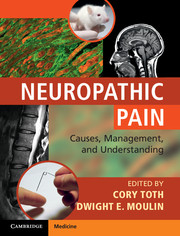Book contents
- Neuropathic Pain
- Neuropathic Pain
- Copyright page
- Contents
- Contributors
- Preface
- Section 1 The Clinical Presentation of Neuropathic Pain
- Section 2 The Condition of Neuropathic Pain
- Section 3 The Specific Condition: Peripheral Neuropathic Pain
- Section 4 The Specific Condition: Central Neuropathic Pain
- Section 5 The Specific Condition: Other Causes of Neuropathic Pain
- Section 6 The Management of Neuropathic Pain
- Chapter 18 Antidepressants: TCAs and SNRIs
- Chapter 19 Gabapentinoids and other anticonvulsants
- Chapter 20 Opioids
- Chapter 21 Cannabinoids
- Chapter 22 Local anesthetics and other interventional approaches
- Chapter 23 Spinal cord stimulation and other neuromodulation
- Chapter 24 Drug synergy and therapeutic combinations
- Chapter 25 The person with pain perspective and participation – an essential component of successfully managing chronic neuropathic pain
- Section 7 The Prognosis of Neuropathic Pain
- Index
Chapter 25 - The person with pain perspective and participation – an essential component of successfully managing chronic neuropathic pain
from Section 6 - The Management of Neuropathic Pain
Published online by Cambridge University Press: 05 December 2013
- Neuropathic Pain
- Neuropathic Pain
- Copyright page
- Contents
- Contributors
- Preface
- Section 1 The Clinical Presentation of Neuropathic Pain
- Section 2 The Condition of Neuropathic Pain
- Section 3 The Specific Condition: Peripheral Neuropathic Pain
- Section 4 The Specific Condition: Central Neuropathic Pain
- Section 5 The Specific Condition: Other Causes of Neuropathic Pain
- Section 6 The Management of Neuropathic Pain
- Chapter 18 Antidepressants: TCAs and SNRIs
- Chapter 19 Gabapentinoids and other anticonvulsants
- Chapter 20 Opioids
- Chapter 21 Cannabinoids
- Chapter 22 Local anesthetics and other interventional approaches
- Chapter 23 Spinal cord stimulation and other neuromodulation
- Chapter 24 Drug synergy and therapeutic combinations
- Chapter 25 The person with pain perspective and participation – an essential component of successfully managing chronic neuropathic pain
- Section 7 The Prognosis of Neuropathic Pain
- Index
Summary
Keywords
- Type
- Chapter
- Information
- Neuropathic PainCauses, Management and Understanding, pp. 299 - 314Publisher: Cambridge University PressPrint publication year: 2013

